Last Sunday, the 31st October 2021, marked 21 years since the United Nations Security Council signed the landmark Resolution 1325, formalising what was a much longer fight to get the world to recognise the role of women in the maintenance and promotion of peace and security. Growing out of the transformative climate established by the 1995 Beijing Declaration and Platform for Action, the Women, Peace and Security (WPS) Agenda set its sights on convincing international security actors to commit to a more equitable, feminist peace project. Resolution 1325 urged states to increase the participation of women and incorporate gender perspectives in all national and UN peace and security efforts, putting women's conflict experiences at the heart of security analyses. The Agenda thus built its foundations on three Ps: women's participation in conflict resolution; gender equality as a conflict prevention mechanism; and women's protection from violence during and after conflict.
In the 21 years since this momentous day, resolution 1325 and its ensuing family of resolutions - 1820 (2009); 1888 (2009); 1889 (2010); 1960 (2011); 2106 (2013); 2122 (2013); 2242 (2015), 2467 (2019), and 2493 (2019) - has, in many ways, successfully brought women into the 'elite world of masculine high politics'. It has given us the language to talk about women's roles within politics and the armed forces, carved a seat at the table for women in conflict resolution, and enabled conflict-related sexual violence to be seen as a serious international crime warranting a serious international response. However, the story of this Agenda has equally invited much scepticism; conflicts are not being prevented, women continue to be both subject to gendered violence and routinely excluded from peace processes, the practice of 'gender mainstreaming' has largely undermined many of its goals, and, ultimately, gender equality remains a utopian ideal. Is a seat at the table enough when the order of business has a distinctly patriarchal feel?
The 'coming of age' of Women, Peace, and Security - reached poignantly during the height of the coronavirus and its associated 'disaster patriarchy' fuelled 'war on women' - brought much reflection on the success of this Agenda in securing the future promised a quarter of a century earlier in Beijing. And now, the world has watched Afghanistan be taken over once again by the Taliban, a move which puts at grave risk many of the rights and freedoms which had initially justified international intervention in the country in 2001. What, then, does this mean for the next decade of the feminist peace project? How will the Women, Peace and Security Agenda take to 'adulthood', and will this involve critical reflection on the mistakes of its youth?
My scepticism, however, does not preclude optimism. I am buoyed by the brilliant minds working in this space, a fact that was made abundantly clear during our recent Twitter Hour. We are extremely keen to hear from more scholars researching along the intersection of gender and violence, and we are dreaming up panels and paper opportunities in order to keep these conversations alive and, importantly, critically conscious as we enter the WPS Agenda's 22nd year. Don't hesitate to get in contact if you would like to be involved in this work.
As always, we wish you a happy and healthy month!
See the full newsletter here: Women, Peace and Security
Visit the Newsletter Catalogue to catch up on all our past issues!

